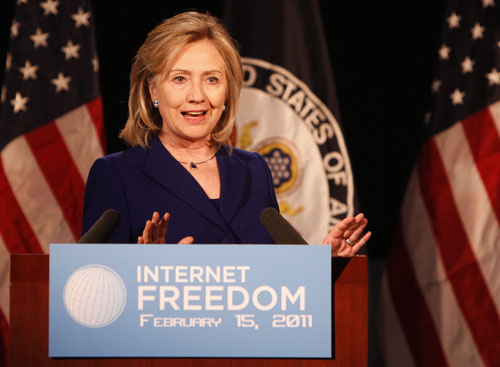
In the wake of historic protests in Egypt spurred by the use of social media, Secretary of State Hillary Clinton delivered a speech in strong support of Internet freedom in Jack Morton Auditorium Tuesday.
Clinton commended Egyptians and journalists who took to Facebook and Twitter to organize protests and share stories from Cairo before the government shut down Internet access.
The former first lady said the protests in Egypt, which ended last week with former President Hosni Mubarak’s resignation, paralleled those in Iran almost two years ago when Iranians took to the streets and to Twitter in opposition to President Mahmoud Ahmadinejad’s reelection.
“What happened in Egypt and what happened in Iran, which this week is once again using violence against protesters seeking basic freedoms, was about a great deal more than the Internet,” Clinton said. “In each case people protested because of deep frustrations with the political and economic division of their lives.”
While protesters marched and chanted, Clinton said, the authorities blocked and arrested them.
“The Internet did not do any of those things,” Clinton said. “People did.”
Urging countries, including China, Cuba and Iran, to lessen Internet restrictions for their citizens, Clinton acknowledged the challenges that can arise between achieving both online liberty and security in the modern era.
Terrorists and extremist groups use the Internet to recruit, child pornographers use it to exploit children and hackers use it to target financial institutions, she said.
“We need successful strategies for combating these threats without constricting the openness that’s the Internet’s greatest attribute,” Clinton said.
Saying that much of the value of the Internet comes from its role in the marketplace of ideas, Clinton said the Internet should be used as a discussion tool to combat intolerance, rather than to censor ideas completely.
“The better answer to offensive speech is more speech,” Clinton said. “Deleting writing, blocking content — these actions suppress words but do not touch the underlying ideas.”
Speaking on transparency, Clinton addressed WikiLeaks, the website that has released thousands of classified diplomatic cables. She disputed the notion that the government has a responsibility to conduct all of its work in full view of its citizens.
“The United States could neither provide for citizen security nor promote the cause of democracy around the world if we had to make public every step of our efforts,” Clinton said.
Clinton’s speech was punctuated once at the beginning when an unidentified elderly man wearing a “Veterans for Peace” T-shirt stood up in the middle of the crowd to turn his back on her, standing silently and staring at the back of the auditorium for several minutes. After not responding when a security officer asked him to sit down, two officers dragged him shouting out of the auditorium.




